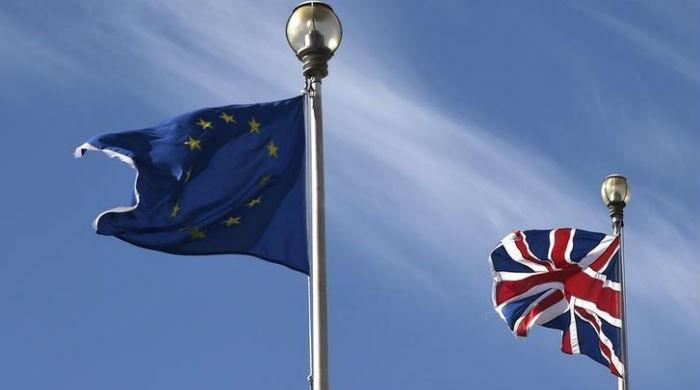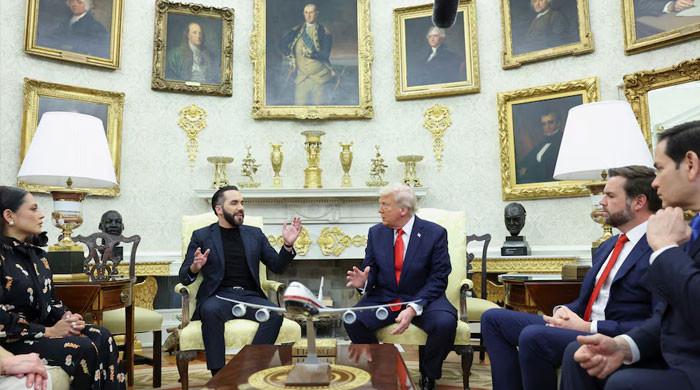Post-Brexit: UK might use King Henry VIII powers to change 1,000 EU-related laws
Prime Minister Theresa May started the much awaited negotiations on Brexit with huge economic, political, social and security implication on March 29
March 30, 2017

BRUSSELS: Britain, while formally invoking article 50 of Lisbon Treaty, threatened that it will weaken the security cooperation with EU in case of a “Dirty Brexit”. Britain also wants free trade agreements and the assurance that nothing will affect her special relationship with the republic of Ireland.
With a six-page letter officially delivered to the president of European Council on Monday, March 29, Prime Minister Theresa May started the much awaited negotiations on Brexit with huge economic, political, social and security implications. Meanwhile, EU will have to follow the process of finalising negotiation proposals and getting it approved from national governments and EU parliament before entering into formal negotiations. The EU Council has nominated former French politician, Michel Barnier as the lead negotiator. The negotiations shall include subjects like trade terms, immigration rules and financial regulations.
The EU parliament's president Antonio Tajani and chief negotiator for Brexit, Guy Verhofstadt, presented the draft resolution for Brexit, according to which the EU will negotiate matters including the legal status of EU and the UK diaspora, the settlement of financial obligations, the Union’s external border and the clarification of the status of the UK's international commitments taken as a member of the EU.
The draft will also discuss the legal certainty for legal entities including companies, and the designation of the Court of Justice of the European Union as the competent authority for the interpretation and enforcement of the withdrawal agreement.
On the other hand, Britain will repeal the European Community Act 1972 with help from the newly-formed Department for Exiting the European Union under David Devis. As a way out, likely to be rejected by Labour party, the British government has decided to use the powers of King Henry VIII to change over 1,000 laws related to EU, without full parliamentary debate.
‘We are leaving European Union but not Europe’
The seemingly unsentimental letter from Britain justifies divorce in order to “restore the self-determination”. While emphasising upon constructive and result-oriented negotiations, the letter hopes to forge a deep post-Brexit partnership with EU. “We are leaving European Union but not Europe”, say the letter. Britain wants continuity and certainty, “in particular for business” and a special partnership that “takes in both economic and security cooperation”. Unlike EU officials, Britain demands “comprehensive' agreement on the “terms of our future partnership alongside with those of our withdrawal from EU.”
While deciding to regain control over immigration, Britain wants a “bold and ambitious Free Trade Agreement covering financial services and Network Industries”.
Don’t forget your security problems
The letter reminds Europe that “growth of global trade is slowing and there are signs that protectionist instincts are on the rise in many parts of the world. The letter also declares, “in security terms, a failure to reach agreement would mean our cooperation in the fight against crime and terrorism would be weakened.”
The European Counter Terrorism strategy depends a lot on the information sharing and common information pool. Britain’s agencies and counter-terrorism mechanisms are considered as highly efficient and well coordinated. According to one report, British law enforcers have thwarted 13 terrorism plots in recent years. Any refusal to cooperate in security measures can seriously hamper the ongoing war against terror leaving Europe vulnerable to the terror threat.
Analysts confirm that national governments and European institutions need information sharing and common strategy. According to former EU counter terrorism coordinator, Gijs de Vries, as reported by The New Europe,” Britain would lose database that secures security details such as DNA, fingerprints and vehicle information and it would lost access to legal instruments that allow member states to quickly extradite criminal suspects.”
The existential threat
Brexit poses “existential” threat to both Britain and EU. The EU cannot afford to let it become a likable precedent for other member states especially when many far-right populists are gaining strength for promising break up from EU. Britain, on the other hand, is facing yet another decision to hold referendum of independence announced by Scottish parliament. Irish nationalists have also rejected Brexit and renewed their campaign to leave Britain.
Despite positive sentiments expressed by all the major leaders, the sense of disappointment and confusion is already visible. As Donald Tusk said, “there is no reason to pretend that it is a happy day”. French President Francois Hollande recently clarified that, “by necessity, UK will pay the consequences, because that is the choice it has made.”
The chief EU negotiator, Micheal Burnier said, “This free-trade agreement cannot be equivalent to what exists today. And we should all prepare ourselves for that situation.”












